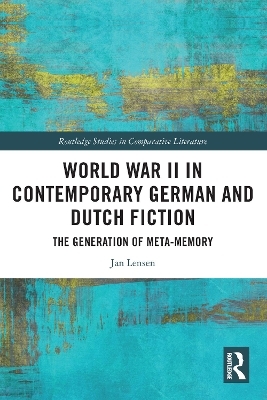
World War II in Contemporary German and Dutch Fiction
Routledge (Verlag)
978-0-367-71148-1 (ISBN)
World War II in Contemporary German and Dutch Fiction: The Generation of Meta-Memory offers a comparative study of the construction of World War II memory in contemporary German, Flemish, and Dutch literature. More specifically, it investigates in what ways the large temporal distance to the historical events has impacted how literary writers from these three literatures have negotiated its meaning and form during the last decades. To that end, this book offers analyses of nine novels that demonstrate a pronounced reflexivity on the conditions of contemporary remembering. Rather than a dig for historical truth or a struggle with historical trauma, these novels reflect on the transmission, the narrative shapes, the formation processes, and the functions of World War II memory today, while asserting a self-conscious and often irreverent approach toward established mnemonic routines, practices, and rules. As the analyses show, this approach is equally articulated through the novels’ poetics, which are marked by a large formal diversity and a playfulness that highlights mnemonic agency, a posttraumatic positioning, and the ascendency of the literary over the historiographical. Based on these findings, this book proposes the emergence of a new paradigm within the postwar cultural assessment of World War II: the generation of meta-memory.
Contents
Acknowledgments
The Generation of Meta-Memory: An Introduction
Part I – Of Perpetrators and Victims
Chapter 1 – ‘Ein verwandter Ton’: The (Im)possibility of German Victimhood in Marcel Beyer’s Flughunde (1995)
Chapter 2 – ‘In Search of a More Bearable Tomb’: Narrative Integration and Heteroglossia in Erwin Mortier’s Marcel (1999)
Chapter 3 – The Comfort Corner of Victimhood: Holocaust Victimhood in Arnon Grunberg’s De joodse messias (2004)
Part II – Memory on the Move?
Chapter 4 – The Names of the Dead in Our Communal Cemeteries: The Case for a European Collective Memory in Koen Peeters’s Grote Europese roman (2007)
Chapter 5 – Claiming Memory Citizenship in Mano Bouzamour’s De belofte van Pisa (2014)
Chapter 6 – Moving in and out of the Feedback Loop: History and ‘Globital’ Memory in Peter Verhelst’s Zwerm (2005)
Part III – The Play with Memory
Chapter 7 – ‘Irgendwo zwischen Müllverbrennungsanlage und dem bleistiftförmigen Fallturm der Universität’: Personal Memory and Autofiction in Per Leo’s Flut und Boden (2014)
Chapter 8 – ‘Wir stören uns nicht daran’: Stylistic Refinement and the Play with Referentiality in Kevin Vennemann’s Nahe Jedenew (2005)
Chapter 9 – ‘With a stretched arm. Like Superman, not like Hitler’: Irreverent Play with Memory in Astronaut van Oranje (2013) by Andy Fierens and Michaël Brijs
Afterword: A Move out of the Grip of the Past?
Index
| Erscheinungsdatum | 29.03.2021 |
|---|---|
| Reihe/Serie | Routledge Studies in Comparative Literature |
| Verlagsort | London |
| Sprache | englisch |
| Maße | 152 x 229 mm |
| Gewicht | 362 g |
| Themenwelt | Geschichte ► Allgemeine Geschichte ► Neuzeit (bis 1918) |
| Geschichte ► Allgemeine Geschichte ► 1918 bis 1945 | |
| Geschichte ► Teilgebiete der Geschichte ► Militärgeschichte | |
| Geisteswissenschaften ► Psychologie ► Allgemeine Psychologie | |
| Geisteswissenschaften ► Sprach- / Literaturwissenschaft ► Anglistik / Amerikanistik | |
| Geisteswissenschaften ► Sprach- / Literaturwissenschaft ► Literaturwissenschaft | |
| Medizin / Pharmazie ► Medizinische Fachgebiete ► Psychiatrie / Psychotherapie | |
| ISBN-10 | 0-367-71148-6 / 0367711486 |
| ISBN-13 | 978-0-367-71148-1 / 9780367711481 |
| Zustand | Neuware |
| Haben Sie eine Frage zum Produkt? |
aus dem Bereich


